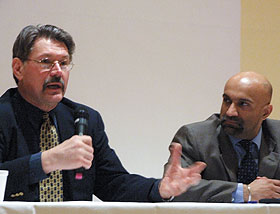  |
| HOME | THIS ISSUE | CALENDAR | GRANTS | BACK ISSUES | < BACK | NEXT > |
Health Center specialists discuss little known heart conditions by Maureen McGuire - March 17, 2008 | ||||
| A heart attack isn’t the only cardiovascular condition that can seriously threaten someone’s health. Other heart problems – less widely understood by the public and often symptom-free – can be just as serious, for both men and women. That was the message experts with the Pat and Jim Calhoun Cardiology Center delivered Feb. 26 during a Discovery Series lecture at the Health Center. “Most people are familiar with the signs, symptoms, and even the causes of heart attack,” said Dr. Bruce Liang, director of the Cardiology Center. “Our goal is to raise awareness about some of the other extremely dangerous cardiovascular conditions such as valve disease and peripheral arterial disease.” The approximately 200 people who attended the nearly three-hour program were told that:
“Valve disease can be quite silent even when a valve is very leaky,” said Liang. He explained that the heart valves work like flaps to keep blood flowing in one direction. Normally, the mitral valve opens to let blood flow from the left atrium to the ventricle. The aortic valve opens to let blood flow from the heart into the aorta. “When either valve fails to close properly, a condition known as regurgitation occurs,” he said. “In this condition, blood flows or leaks back into the area of the heart that it just left, sometimes resulting in shortness of breath and easy fatigue.” Another common valve disease is aortic stenosis, the narrowing of the aortic valve. “The key is to detect and diagnose valve disease at an early stage,” Liang said, noting that echocardiography, a non-invasive test that allows experts to visualize the heart’s chambers, is the best diagnostic and surveillance test for valve disease. Treatments for valve disease include medications and, if necessary, surgical interventions such as valve replacement or repair, all of which are offered at the Calhoun Cardiology Center. Dr. Kanwar Singh, director of vascular medicine and intervention who recently joined the faculty of the Cardiology Center, and Dr. Michael Dahn, a vascular surgeon and director of the endovascular service, discussed the causes and treatments of peripheral arterial disease (PAD).
Like valve disease, PAD can have no symptoms, even when the condition is in an advanced stage. Fortunately, they explained, there is an effective screening test that is strongly recommended for everyone over age 70. “PAD is a set of disorders that affects arteries that are not in the heart,” Singh said. Added Dahn, “It is caused when the process of atherosclerosis occurs, and fatty plaque in the arteries occupies space normally occupied by blood flow.” As is the case with coronary artery disease, the plaque that fuels PAD is caused by factors such as smoking and cholesterol disorders, as well as diabetes, autoimmune problems, and inflammatory conditions, the speakers explained. The screening test for PAD is called a highly accurate one that contrasts blood pressure readings in the arms and just above the ankles to detect the presence of PAD in the leg. UConn specialists urge all people over age 70 to be screened, and encourage those over 50 with significant risk factors, such as smoking or diabetes, to start screening. “PAD is a ubiquitous disease,” said Dahn. “If you have a blockage in your leg, you are likely to develop a blockage in your heart leading to a heart attack, or your carotid artery, leading to a stroke. This is very serious and requires immediate attention.” He said the Health Center offers both open surgical procedures, such as femoral bypass surgery to remove plaque from arteries, and minimally invasive procedures, which do the same thing without general anesthesia, large incisions, or scarring, and promote faster recovery periods. “Whenever possible,” he added, “we go with minimally invasive surgery.” For more information about the Calhoun Cardiology Center, go to heart.uchc.edu. To be added to the mailing list for upcoming Discovery Series programs, call 800-535-6232. |
| ADVANCE HOME UCONN HOME |

